(完整版)Unit7TheMonster课文翻译综合教程四
(完整版)Unit7TheMonster课文翻译综合教程四
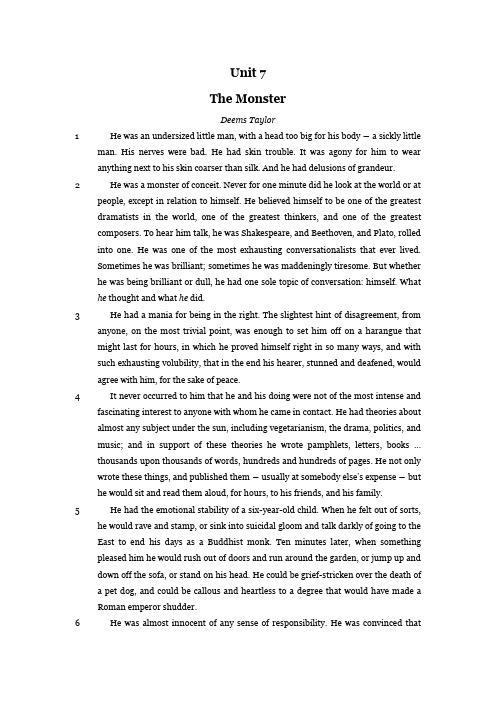
Unit 7The MonsterDeems Taylor1He was an undersized little man, with a head too big for his body ― a sickly little man. His nerves were bad. He had skin trouble. It was agony for him to wear anything next to his skin coarser than silk. And he had delusions of grandeur.2He was a monster of conceit. Never for one minute did he look at the world or at people, except in relation to himself. He believed himself to be one of the greatest dramatists in the world, one of the greatest thinkers, and one of the greatest composers. To hear him talk, he was Shakespeare, and Beethoven, and Plato, rolled into one. He was one of the most exhausting conversationalists that ever lived.Sometimes he was brilliant; sometimes he was maddeningly tiresome. But whether he was being brilliant or dull, he had one sole topic of conversation: himself. What he thought and what he did.3He had a mania for being in the right. The slightest hint of disagreement, from anyone, on the most trivial point, was enough to set him off on a harangue that might last for hours, in which he proved himself right in so many ways, and with such exhausting volubility, that in the end his hearer, stunned and deafened, would agree with him, for the sake of peace.4It never occurred to him that he and his doing were not of the most intense and fascinating interest to anyone with whom he came in contact. He had theories about almost any subject under the sun, including vegetarianism, the drama, politics, and music; and in support of these theories he wrote pamphlets, letters, books ...thousands upon thousands of words, hundreds and hundreds of pages. He not only wrote these things, and published them ― usually at somebody else’s expense ― but he would sit and read them aloud, for hours, to his friends, and his family.5He had the emotional stability of a six-year-old child. When he felt out of sorts, he would rave and stamp, or sink into suicidal gloom and talk darkly of going to the East to end his days as a Buddhist monk. Ten minutes later, when something pleased him he would rush out of doors and run around the garden, or jump up and down off the sofa, or stand on his head. He could be grief-stricken over the death ofa pet dog, and could be callous and heartless to a degree that would have made aRoman emperor shudder.6He was almost innocent of any sense of responsibility. He was convinced thatthe world owed him a living. In support of this belief, he borrowed money from everybody who was good for a loan ― men, women, friends, or strange rs. He wrote begging letters by the score, sometimes groveling without shame, at others loftily offering his intended benefactor the privilege of contributing to his support, and being mortally offended if the recipient declined the honor.7What money he could lay his hand on he spent like an Indian rajah. No one will ever know ― certainly he never knows ― how much money he owed. We do know that his greatest benefactor gave him $6,000 to pay the most pressing of his debts in one city, and a year later had to give him $16,000 to enable him to live in another city without being thrown into jail for debt.8He was equally unscrupulous in other ways. An endless procession of women marched through his life. His first wife spent twenty years enduring and forgiving his infidelities. His second wife had been the wife of his most devoted friend and admirer, from whom he stole her. And even while he was trying to persuade her to leave her first husband he was writing to a friend to inquire whether he could suggest some wealthy woman ― any wealthy woman ― whom he could marry for her money.9He had a genius for making enemies. He would insult a man who disagreed with him about the weather. He would pull endless wires in order to meet some man who admired his work and was able and anxious to be of use to him ― and would proceed to make a mortal enemy of him with some idiotic and wholly uncalled-for exhibition of arrogance and bad manners. A character in one of his operas was a caricature of one of the most powerful music critics of his day. Not content with burlesquing him, he invited the critic to his house and read him the libretto aloud in front of his friends.10The name of this monster was Richard Wagner. Everything I have said about him you can find on record ― in newspapers, in police reports, in the testimony of people who knew him, in his own letters, between the lines of his autobiography.And the curious thing about this record is that it doesn’t matter in the least.11Because this undersized, sickly, disagreeable, fascinating little man was right all the time, the joke was on us. He was one of the world’s greatest dramatists; he was a great thinker; he was one of the most stupendous musical geniuses that, up to now, the world has ever seen. The world did owe him a living. What if he did talk about himself all the time? If he talked about himself for twenty-four hours every day for the span of his life he would not have uttered half the number of words that othermen have spoken and written about him since his death.12When you consider what he wrote ― thirteen operas and music dramas, eleven of them still holding the stage, eight of them unquestionably worth ranking among the world’s great musico-dramatic masterpieces ― when you listen to what he wrote, the debts and heartaches that people had to endure from him don’t seem much of a price.13What if he was faithless to his friends and to his wives? He had one mistress to whom he was faithful to the day of his death: Music. Not for a single moment did he ever compromise with what he believed, with what he dreamed. There is not a line of his music that could have been conceived by a little mind. Even when he is dull, or downright bad, he is dull in the grand manner. Listening to his music, one does not forgive him for what he may or may not have been. It is not a matter of forgiveness. It is a matter of being dumb with wonder that his poor brain and body didn’t burst under the torment of the demon of creative energy that lived inside him, struggling, clawing, scratching to be released; tearing, shrieking at him to write the music that was in him. The miracle is that what he did in the little space of seventy years could have been done at all, even by a great genius. Is it any wonder he had no time to be a man?畸人迪姆斯·泰勒1 他是个大头小身体、病怏怏的矬子;成日神经兮兮,皮肤也有毛病。
大学英语综合教程4Unit7
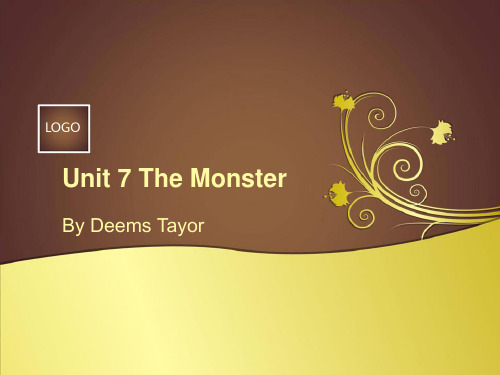
• conceit n.excessive pride in oneself自负;骄傲 自大 • e.g. He emits confidence without coceit.他表现出 自信但不骄傲。 • adj.conceited 自负的;骄傲自大的 • adv.conceitedly 自负地;骄傲自大地
• The slightest hint of disagreement, from anyone, on the most trivial point, was enough to set him off on a harangue that might last for hours, in which he proved himself right in so many ways, and with such exhausting volubility, that in the end his hearer, stunned and deafened, would agree with him, for the sake of peace. • 句子的主干The slightest hint of disagreement,was enough to set him off on a harangue。 • from anyone,作后置定语 修饰 disagreement • on the most trivial point,作状语 • that might last for hours, in which he proved himself right 都修饰 a harangue
• Why did Wagner take himself to be the center of his conversations? • How did Wagner respond to disagreement?
Unit 7 The Monster Words and Expressions综合教程四

UNIT 7 THE MONSTERWords and Expressionsundersized:a. smaller than the usual or normal sizeAntonym: oversizede.g.Although he seemed thin and undersized compared with his cousins, he was reallyas hard as nails and didn’t fall ill half as often as th ey did.agony: n. very severe pain; a very sad, difficult, or unpleasant experiencee.g.It was agony not knowing if she would live.He groaned in agony.delusion: n.a false belief or opinionCollocation: under the delusion (that)e.g.That sick man is under the delusion that he is Napoleon.He is under the delusion that I am going to cheat him.delusions of grandeur(妄自尊大): a belief that you are more important than you really arein/with relation to: with/in reference to; concerning; with regard toe.g.It’s best to plan with relation to anticipated changes in one’s earnings.Demand is high in relation to supply.That argument changes nothing with relation to our plans for hiring workers.(all) rolled into one: integrate several things or features into onee.g.She has become his assistant and secretary rolled into one.mania: n. extremely strong enthusiasm for sth., esp. among a lot of people Synonym: craze; fad; obsessione.g.The country has a mania for soccer.She has a mania for driving fast cars.set sb. off: make sb. start to laugh, cry, or talk a lote.g.Your rude behavior set off Mrs. Franklin.My sister was an unpredictable young woman, and I never knew what would set her off.for the sake of sb. / fo r sb.’s sake: for the good or advantage ofe.g.If you won’t do it for your own sake, then do it for mine.Their parents only stayed together for the sake of the children.for the sake of sth. / for sth.’s sake: because of; for the purpose ofe.g. I’ll give up smoking for the sake of health.My art does not try to serve society; it’s just art for art’s sake.at sb.’s expense: with sb. paying the coste.g.He had his book printed at his own expense.We were entertained at the editor’s expense.at the expense of: causing the loss ofe.g.He finished the job at the expense of his health.out of sorts: in a bad temper; feeling unwell or annoyede.g.He was out of sorts because of the weather.by the score: large numbers of, a great manye.g.There are fans by the score waiting for the star at the entrance.grovel: v. show too much respect for sb. or be too willing to obey sb., because you want to please them or you are afraid of themCollocation: grovel at the feet of sb. 拜倒在某人的脚下e.g.The dog grovelled at his feet when he shouted at it.lay/get/put hands on: find, obtaine.g. As soon as I lay hands on the book, I’ll call you.He couldn’t seem to put his hands on last year’s sales figures.pull wires/strings: use one’s influence or authority, usually in secret, in order to bring about a desired result.e.g.He had his uncle pull strings to get him a promotion.If you want to see our boss I can pull strings for you.(read) between the lines: understand the unexpressed but implied meaning of sth. said or writtene.g.Her letter sounded cheerful enough, but I read a certain sadness between the lines.They say that everything’s fine, but reading between the lines I suspect they have some marital problems.hold the stage: be performed; be the center of attentione.g.We had only one hour to discuss the question and Mr. Hones held the stage for most of it.compromise: v. reach an agreement in which everyone involved accepts less than what they wanted at firstCollocation: compromise with sb.e.g.She admitted that she was unable to compromise.His workmates demanded that he never compromise with the bosses.compromise: n.Collocation: reach / arrive at / come to / make a compromisee.g.Both sides have agreed to meet, in the hope of reaching a compromise.Neither of them is willing to make compromises.Cultural background1. List of some common musical instruments1) Stringed Instruments 弦乐器Viola 中提琴Cello 大提琴Guitar 吉他Violin 小提琴Harp 竖琴2) Keyboard Instruments键盘乐器Piano 钢琴Pipe organ 管风琴3) Percussion Instruments打击乐器Triangle 三角铁Drum 大鼓Cymbal 钹Gong 锣Tambourine 铃鼓Xylophone 木琴Dulcimer 扬琴Chimes/Tubular bell 管钟4) Wind Instrument 管乐器;吹奏乐器①Brass Instruments 铜管乐器French horn 法国号Bugle 单号/军乐号Cornet 短号Trumpet 小号②Woodwind Instruments木管乐器Clarinet 单簧管Bassoon 低音管/巴松管Flute 长笛Oboe 双簧管Saxophone 萨克斯Accordion 手风琴harmonica 口琴2. List of some musical termsThis is a list of musical terms that are likely to be encountered in printed scores, music reviews, and program notes.cycle套曲: a set of songs intended to be performed as a groupsuite组曲: an instrumental piece consisting of several shorter piecessonata奏鸣曲: a piece of music for one instrument or for one instrument and piano, usually divided into three or four partssymphony交响曲: an elaborate musical composition for full orchestra, typically in four movements, at least one of which is traditionally in sonata formconcerto协奏曲: a musical composition for a solo instrument or instruments accompanied by an orchestra, especially one conceived on a relatively large scale overture序曲: an orchestral piece at the beginning of an opera, suite, play, oratorio, or other extended compositionprelude前奏曲: an introductory piece of music, most commonly an orchestral opening to an act of an opera, the first movement of a suite, or a piece preceding a fugue impromptu即兴曲: a short piece of instrumental music, especially a solo, that is reminiscent of an improvisationaccompaniment伴奏: the part of a piece of music that supports the tune or someone singingsolo独奏;独唱: a piece of vocal or instrumental music or a dance, or a part or passage in one, for one performerensemble重奏;重唱: a group of musicians, dancers, or actors who perform together chamber music室内乐: music for a small ensemble of instruments, intended for performance in a room or chamber, as opposed to a church or larger buildingduet二重奏: a piece of music written for two performers. On the piano such a piece would involve two players on one instrument.trio三重奏: a composition designed for three players or the name of a group of three playersquartet四重奏: a composition for four players or the name for a group of four players。
新大学英语综合教程Unit4 5 7 课文原文及翻译
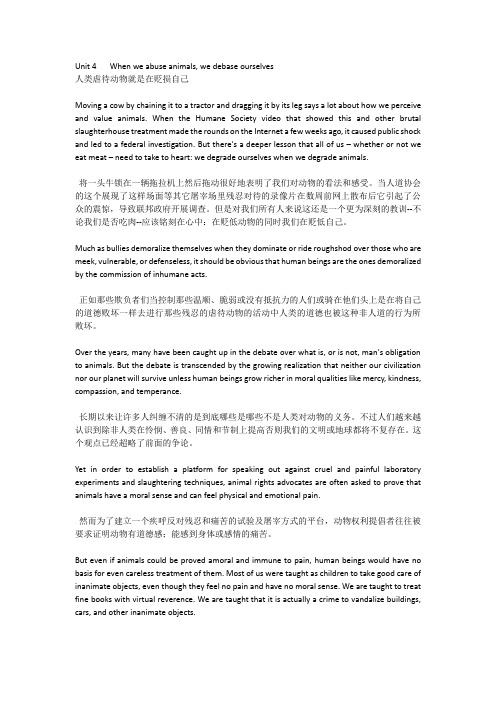
Unit 4 When we abuse animals, we debase ourselves人类虐待动物就是在贬损自己Moving a cow by chaining it to a tractor and dragging it by its leg says a lot about how we perceive and value animals. When the Humane Society video that showed this and other brutal slaughterhouse treatment made the rounds on the Internet a few weeks ago, it caused public shock and led to a federal investigation. But there's a deeper lesson that all of us – whether or not we eat meat – need to take to heart: we degrade ourselves when we degrade animals.将一头牛锁在一辆拖拉机上然后拖动很好地表明了我们对动物的看法和感受。
当人道协会的这个展现了这样场面等其它屠宰场里残忍对待的录像片在数周前网上散布后它引起了公众的震惊,导致联邦政府开展调查。
但是对我们所有人来说这还是一个更为深刻的教训--不论我们是否吃肉--应该铭刻在心中:在贬低动物的同时我们在贬低自己。
Much as bullies demoralize themselves when they dominate or ride roughshod over those who are meek, vulnerable, or defenseless, it should be obvious that human beings are the ones demoralized by the commission of inhumane acts.正如那些欺负者们当控制那些温顺、脆弱或没有抵抗力的人们或骑在他们头上是在将自己的道德败坏一样去进行那些残忍的虐待动物的活动中人类的道德也被这种非人道的行为所败坏。
新世纪大学英语综合教程4课文翻译Unit7
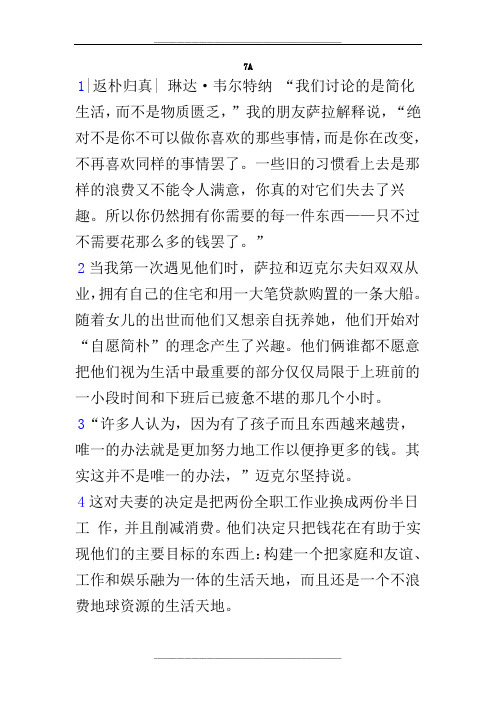
7A1|返朴归真| 琳达·韦尔特纳“我们讨论的是简化生活,而不是物质匮乏,”我的朋友萨拉解释说,“绝对不是你不可以做你喜欢的那些事情,而是你在改变,不再喜欢同样的事情罢了。
一些旧的习惯看上去是那样的浪费又不能令人满意,你真的对它们失去了兴趣。
所以你仍然拥有你需要的每一件东西——只不过不需要花那么多的钱罢了。
”2当我第一次遇见他们时,萨拉和迈克尔夫妇双双从业,拥有自己的住宅和用一大笔贷款购置的一条大船。
随着女儿的出世而他们又想亲自抚养她,他们开始对“自愿简朴”的理念产生了兴趣。
他们俩谁都不愿意把他们视为生活中最重要的部分仅仅局限于上班前的一小段时间和下班后已疲惫不堪的那几个小时。
3“许多人认为,因为有了孩子而且东西越来越贵,唯一的办法就是更加努力地工作以便挣更多的钱。
其实这并不是唯一的办法,”迈克尔坚持说。
4这对夫妻的决定是把两份全职工作业换成两份半日工作,并且削减消费。
他们决定只把钱花在有助于实现他们的主要目标的东西上:构建一个把家庭和友谊、工作和娱乐融为一体的生活天地,而且还是一个不浪费地球资源的生活天地。
5现在他们还在原来的那个近郊社区,住在一幢自己设计的、漂亮而节能的房子里。
按许多标准来看,房子虽然小了点,却容易清扫、布置、维修和供暖。
一层是个大房间,厨房靠墙,摆着一张桦木餐桌和吃饭用的几把椅子;一张舒适的长沙发和一个柴炉就把日常起居的范围圈定了;角落是工作区。
楼上是他们的卧室、一个萨拉和迈克尔共用的办公室和一间浴室。
整幢房子明亮简洁,同周围环境十分和谐。
很快,前门外还要建一个太阳能温室。
6一对只有兼职工作的夫妻怎么会有钱建造自己的房子、拥有一辆汽车并同另一对夫妻共享一艘小船,而且所有这一切都不曾贷款呢?他们如何能够维持足以提供他们想要的“一切”的那样一种高生活水平呢?他们放弃的而且不再怀念是哪些东西呢?7首先,他们放弃了乱七八糟的昂贵东西:(浴室)药柜里满满的从来不用的化妆品和在柜台上随时可以买到的药品;堆放在厨房壁柜里的最终只会丢弃的各种东西。
(完整版)Unit7TheMonster习题答案综合教程四
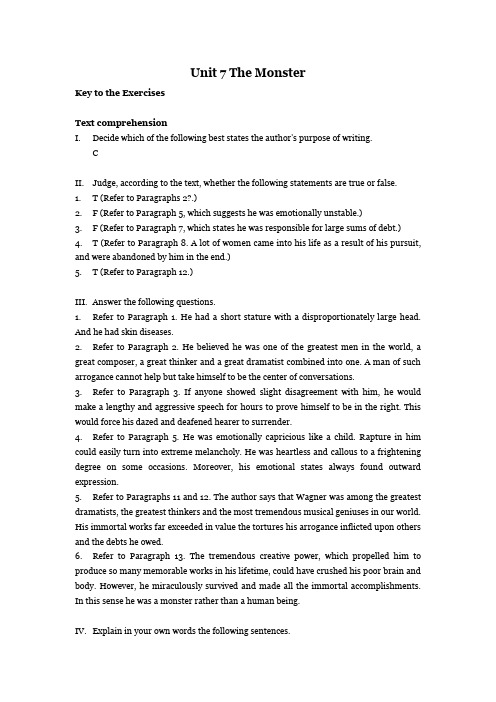
Unit 7 The MonsterKey to the ExercisesText comprehensionI. Decide which of the following best states the author's purpose of writing.CII. Judge, according to the text, whether the following statements are true or false.1. T (Refer to Paragraphs 2?.)2. F (Refer to Paragraph 5, which suggests he was emotionally unstable.)3. F (Refer to Paragraph 7, which states he was responsible for large sums of debt.)4. T (Refer to Paragraph 8. A lot of women came into his life as a result of his pursuit, and were abandoned by him in the end.)5. T (Refer to Paragraph 12.)III. A nswer the following questions.1. Refer to Paragraph 1. He had a short stature with a disproportionately large head. And he had skin diseases.2. Refer to Paragraph 2. He believed he was one of the greatest men in the world, a great composer, a great thinker and a great dramatist combined into one. A man of such arrogance cannot help but take himself to be the center of conversations.3. Refer to Paragraph 3. If anyone showed slight disagreement with him, he would make a lengthy and aggressive speech for hours to prove himself to be in the right. This would force his dazed and deafened hearer to surrender.4. Refer to Paragraph5. He was emotionally capricious like a child. Rapture in him could easily turn into extreme melancholy. He was heartless and callous to a frightening degree on some occasions. Moreover, his emotional states always found outward expression.5. Refer to Paragraphs 11 and 12. The author says that Wagner was among the greatest dramatists, the greatest thinkers and the most tremendous musical geniuses in our world. His immortal works far exceeded in value the tortures his arrogance inflicted upon others and the debts he owed.6. Refer to Paragraph 13. The tremendous creative power, which propelled him to produce so many memorable works in his lifetime, could have crushed his poor brain and body. However, he miraculously survived and made all the immortal accomplishments. In this sense he was a monster rather than a human being.IV. Explain in your own words the following sentences.1. He almost had no sense of responsibility.2. He wrote large numbers of letters begging for money. In some letters he was servile without shame, and in other letters he loftily offered his targeted benefactor the privilege of contributing to his support. If the recipient refused to accept his offer, i.e. refused to lend him money, he would fly into a rage.3. He would use his influence on as many people as possible in order to meet some admirer of his who was only too glad to offer him his help.4. Since Wagner was driven by such tremendous forces, it is no surprise that he didn't behave like a normal human being.Structural analysis of the textIn the first 10 paragraphs, we can find the following words and expressions used to describe Richard Wagner as a monster of conceit: delusions of grandeur / a monster of conceit / believed himself to be one of the greatest dramatists in the world, one of the greatest thinkers, and one of the greatest composers / the most exhausting conversationalist / proved himself right in so many ways / had theories about almost any subject under the sun / almost innocent of any sense of responsibility / an endless procession of women.In the remaining paragraphs, we can find the following words and expressions used to describe him as a great genius: right all the time / one of the world's greatest dramatists / a great thinker / one of the most stupendous musical geniuses / owe him a living.Rhetorical features of the textThe repetitive use of the third person pronoun he creates suspense in the reader's mind. This is one of the effective ways to hold the reader's attention and make him read on.Vocabulary exercisesI. Explain the underlined part in each sentence in your own words.1. person with extremely excessive self-pride2. with all their talents combined in him3. in a bad temper; unwell or annoyed4. without5. use as much influence of his as possible (from behind the scenes)6. make concessionII. Fill in the blank in each sentence with a phrase from the box in its appropriate form.1. pulled wires2. be content with3. rolled into one4. between the lines of5. sink into6. innocent of7. out of sorts8. lay my hands onIII. Fill in the blanks with the appropriate forms of the given words.1. callousness2. tormentor3. inconceivable4. arrogantly5. gloomy6. tragedy7. delusion 8. loftyIV. Choose the word that can replace the underlined part in each sentence without changing its original meaning.1. A2. B3. C4. A5. C6. B7. A8. DV. Give a synonym or an antonym of the word underlined in each sentence in the sense it is used.1. Antonym: humbleness (modesty)2. Synonym: amazing (stunning, miraculous)3. Synonym: cold-blooded (inhumane, merciless)4. Synonym: void5. Antonym: ethical (moral, principled, scrupulous)6. Synonym: parody (caricature)7. Antonym: exhilaration (bliss, ecstasy)8. Synonym: proudly (self-importantly)VI. Explain the meaning of the underlined part in each sentence.1. company2. controlled3. imprecise4. out of fashion5. immediately6. coverGrammar exercisesI. Complete the following sentences with prepositions.1. at2. on3. to4. at5. from6. of7. in, for, at 8. on, of, of9. over 10. on, under, out ofII. Fill in the blank in each sentence with the choice you think the most appropriate. 1. C 2. A 3. B 4. C5. D6. D7. B8. DIII. R ewrite the following paragraph, using appropriate coordinators so as to make it more concise.Both John and I wanted to go to the movies, but we could not agree on which picture we should go to see. A new picture was showing at the Palace and another at the Globe. Neither John nor I had seen either of these pictures. I wanted to see the one at the Globe, but John didn't.IV. Join the sentences in each group into one without using and, but or so.1. My cousin, John, who has a beautiful tenor voice, is appearing at the Royal Festival Hall, where I am going to meet him after the concert.2. The roller coaster, which made its appearance in 1884, is still one of the most exciting rides in an amusement park.3. As I could not find a British-made ballpoint pen, I bought a French one, which was expensive although it was an extremely simple pen.4. Everybody who is interested in brass rubbings should visit our village church because it contains some beautiful brasses which date from the 14th century.5. Despite free medical treatment being available to everybody in the country, there are still a number of private hospitals, which are mostly patronized by foreign visitors who do not want to wait for a bed in a National Health Service hospital.6. Crochet, which used to be a favourite pastime in Victorian times, is back in fashion because clothes have become so expensive that it is worthwhile to make them.7. Clanging its bell, the empty cable car approaches, swaying as though slightly drunk.8. We arrived by plane from Denver, a 16-minute flight that culminated in a breathtaking touchdown at a tiny airport tucked in among the Rocky Mountains.V. Replace the underlined parts by infinitive phrases.1. The child is lonely; he would be happier if he had someone to play with.2. I have some letters to write.3. He was the first man to leave the burning building.4. The pilot was the only man to survive the crash.5. The last one to leave the room must turn out the lights.6. That is the largest ship to be built.7. My files are all over the place. I wish I had a box to keep them in.8. I don't much care for cooking for myself; if I had a family to cook for I'd be more interested.VI. Make sentences of your own after the sentences given below, keeping the underlined structures in your sentences.(Reference version)1. Work interests him to such a degree that he thinks about nothing else.2. What if they do not come?Translation exercisesI. Translate the following sentences into Chinese.1. 任何人只要有一丝半点的不同意见,即使再微不足道,也足够让他高谈阔论几个钟头,用他那十分累人的雄辩从多方面论证自己是正确的,结果是他的听众听得目瞪口呆,两耳震聋,为了息事宁人,只好顺从他。
完整版Unit7TheMonster课文翻译综合教程四
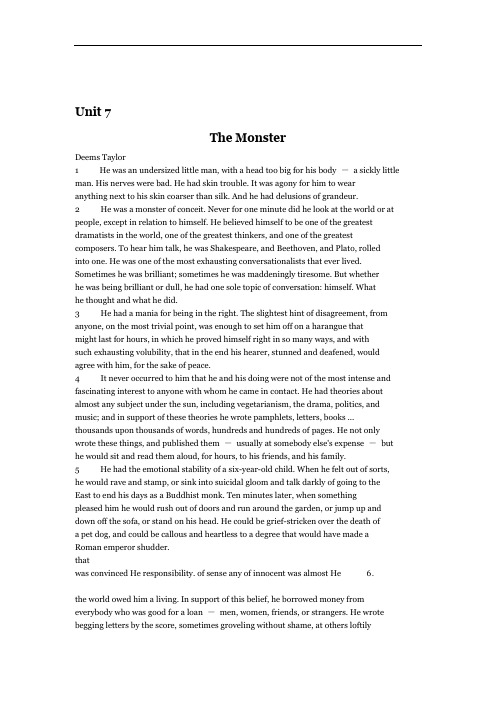
Unit 7The MonsterDeems Taylor1He was an undersized little man, with a head too big for his body ―a sickly little man. His nerves were bad. He had skin trouble. It was agony for him to wearanything next to his skin coarser than silk. And he had delusions of grandeur.2He was a monster of conceit. Never for one minute did he look at the world or at people, except in relation to himself. He believed himself to be one of the greatest dramatists in the world, one of the greatest thinkers, and one of the greatest composers. To hear him talk, he was Shakespeare, and Beethoven, and Plato, rolledinto one. He was one of the most exhausting conversationalists that ever lived. Sometimes he was brilliant; sometimes he was maddeningly tiresome. But whetherhe was being brilliant or dull, he had one sole topic of conversation: himself. Whathe thought and what he did.3He had a mania for being in the right. The slightest hint of disagreement, from anyone, on the most trivial point, was enough to set him off on a harangue thatmight last for hours, in which he proved himself right in so many ways, and withsuch exhausting volubility, that in the end his hearer, stunned and deafened, would agree with him, for the sake of peace.4It never occurred to him that he and his doing were not of the most intense and fascinating interest to anyone with whom he came in contact. He had theories about almost any subject under the sun, including vegetarianism, the drama, politics, and music; and in support of these theories he wrote pamphlets, letters, books ... thousands upon thousands of words, hundreds and hundreds of pages. He not only wrote these things, and published them ―usually at somebody else's expense ―but he would sit and read them aloud, for hours, to his friends, and his family.5He had the emotional stability of a six-year-old child. When he felt out of sorts, he would rave and stamp, or sink into suicidal gloom and talk darkly of going to the East to end his days as a Buddhist monk. Ten minutes later, when somethingpleased him he would rush out of doors and run around the garden, or jump up and down off the sofa, or stand on his head. He could be grief-stricken over the death ofa pet dog, and could be callous and heartless to a degree that would have made a Roman emperor shudder.thatwas convinced He responsibility. of sense any of innocent was almost He 6.the world owed him a living. In support of this belief, he borrowed money from everybody who was good for a loan ―men, women, friends, or strangers. He wrote begging letters by the score, sometimes groveling without shame, at others loftilyoffering his intended benefactor the privilege of contributing to his support, andbeing mortally offended if the recipient declined the honor.7What money he could lay his hand on he spent like an Indian rajah. No one will ever know ―certainly he never knows ―how much money he owed. We do know that his greatest benefactor gave him $6,000 to pay the most pressing of his debtsin one city, and a year later had to give him $16,000 to enable him to live in another city without being thrown into jail for debt.8He was equally unscrupulous in other ways. An endless procession of women marched through his life. His first wife spent twenty years enduring and forgivinghis infidelities. His second wife had been the wife of his most devoted friend and admirer, from whom he stole her. And even while he was trying to persuade her to leave her first husband he was writing to a friend to inquire whether he couldsuggest some wealthy woman ―any wealthy woman ―whom he could marry for her money.9He had a genius for making enemies. He would insult a man who disagreed with him about the weather. He would pull endless wires in order to meet some manwho admired his work and was able and anxious to be of use to him ―and would proceed to make a mortal enemy of him with some idiotic and wholly uncalled-for exhibition of arrogance and bad manners. A character in one of his operas was a caricature of one of the most powerful music critics of his day. Not content with burlesquing him, he invited the critic to his house and read him the libretto aloud in front of his friends.10The name of this monster was Richard Wagner. Everything I have said about him you can find on record ―in newspapers, in police reports, in the testimony of people who knew him, in his own letters, between the lines of his autobiography.And the curious thing about this record is that it doesn't matter in the least.11Because this undersized, sickly, disagreeable, fascinating little man was right all the time, the joke was on us. He was one of the world's greatest dramatists; he was a great thinker; he was one of the most stupendous musical geniuses that, up to now,the world has ever seen. The world did owe him a living. What if he did talk about himself all the time? If he talked about himself for twenty-four hours every day forthe span of his life he would not have uttered half the number of words that othermen have spoken and written about him since his death.12When you consider what he wrote ―thirteen operas and music dramas, eleven of them still holding the stage, eight of them unquestionably worth ranking amongthe world's great musico-dramatic masterpieces ―when you listen to what he wrote, the debts and heartaches that people had to endure from him don't seem much of a price.13What if he was faithless to his friends and to his wives? He had one mistress to whom he was faithful to the day of his death: Music. Not for a single moment did he ever compromise with what he believed, with what he dreamed. There is not a lineof his music that could have been conceived by a little mind. Even when he is dull,or downright bad, he is dull in the grand manner. Listening to his music, one doesnot forgive him for what he may or may not have been. It is not a matter offorgiveness. It is a matter of being dumb with wonder that his poor brain and bodydidn't burst under the torment of the demon of creative energy that lived inside him, struggling, clawing, scratching to be released; tearing, shrieking at him to write themusic that was in him. The miracle is that what he did in the little space of seventyyears could have been done at all, even by a great genius. Is it any wonder he had no time to be a man?畸人迪姆斯·泰勒1 他是个大头小身体、病怏怏的矬子;成日神经兮兮,皮肤也有毛病。
Unit 7 The Monster习题答案综合教程四

Conclusion:
In this article, we discussed the answers to the exercises in Unit 7 of the textbook "The Monster" from Integrated Chinese Level 4. We covered vocabulary building, reading comprehension, grammar practice, listening comprehension, and writing practice. By completing these exercises, students can enhance their understanding of the topic, improve their Chinese language skills, and explore different perspectives on monsters. Remember, facing our fears with courage and an open mind is essential for personal growth and overcoming the monsters within ourselves.
5. Yes, they finally manage to defeat the monster using their intelligence and teamwork.
Exercise 3: Grammar Practice
TheMonster课文翻译
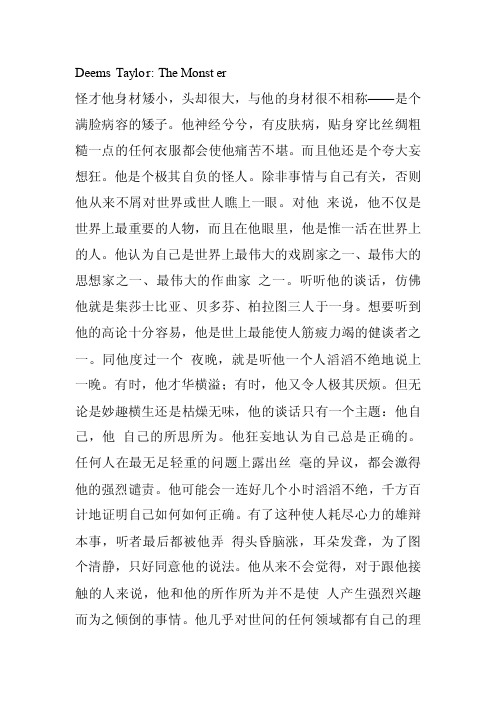
DeemsTaylor: The Monste r怪才他身材矮小,头却很大,与他的身材很不相称——是个满脸病容的矮子。
他神经兮兮,有皮肤病,贴身穿比丝绸粗糙一点的任何衣服都会使他痛苦不堪。
而且他还是个夸大妄想狂。
他是个极其自负的怪人。
除非事情与自己有关,否则他从来不屑对世界或世人瞧上一眼。
对他来说,他不仅是世界上最重要的人物,而且在他眼里,他是惟一活在世界上的人。
他认为自己是世界上最伟大的戏剧家之一、最伟大的思想家之一、最伟大的作曲家之一。
听听他的谈话,仿佛他就是集莎士比亚、贝多芬、柏拉图三人于一身。
想要听到他的高论十分容易,他是世上最能使人筋疲力竭的健谈者之一。
同他度过一个夜晚,就是听他一个人滔滔不绝地说上一晚。
有时,他才华横溢;有时,他又令人极其厌烦。
但无论是妙趣横生还是枯燥无味,他的谈话只有一个主题:他自己,他自己的所思所为。
他狂妄地认为自己总是正确的。
任何人在最无足轻重的问题上露出丝毫的异议,都会激得他的强烈谴责。
他可能会一连好几个小时滔滔不绝,千方百计地证明自己如何如何正确。
有了这种使人耗尽心力的雄辩本事,听者最后都被他弄得头昏脑涨,耳朵发聋,为了图个清静,只好同意他的说法。
他从来不会觉得,对于跟他接触的人来说,他和他的所作所为并不是使人产生强烈兴趣而为之倾倒的事情。
他几乎对世间的任何领域都有自己的理论,包括素食主义、戏剧、政治以及音乐。
为了证实这些理论,他写小册子、写信、写书……文字成千上万,连篇累牍。
他不仅写了,还出版了这些东西——所需费用通常由别人支付——而他会坐下来大声读给朋友和家人听,一读就是好几个小时。
他写歌剧,但往往是刚有个故事梗概,他就邀请——或者更确切说是召集——一群朋友到家里,高声念给大家听。
Unit 7 The Monster课文翻译综合教程四【优质文档】
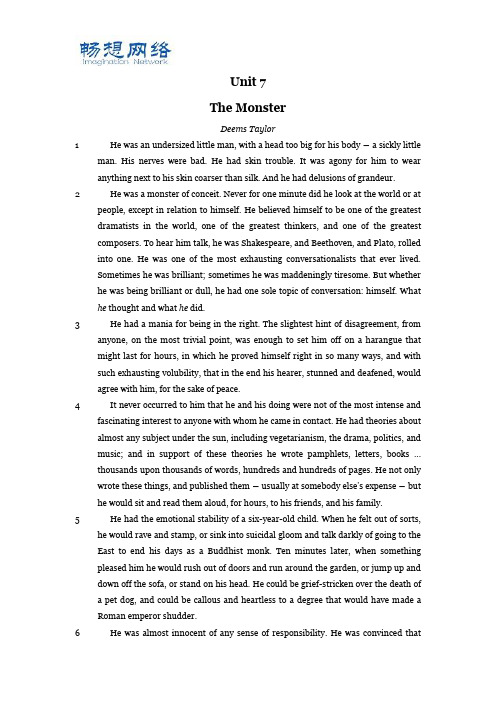
Unit 7The MonsterDeems Taylor1He was an undersized little man, with a head too big for his body ― a sickly little man. His nerves were bad. He had skin trouble. It was agony for him to wear anything next to his skin coarser than silk. And he had delusions of grandeur.2He was a monster of conceit. Never for one minute did he look at the world or at people, except in relation to himself. He believed himself to be one of the greatest dramatists in the world, one of the greatest thinkers, and one of the greatest composers. To hear him talk, he was Shakespeare, and Beethoven, and Plato, rolled into one. He was one of the most exhausting conversationalists that ever lived.Sometimes he was brilliant; sometimes he was maddeningly tiresome. But whether he was being brilliant or dull, he had one sole topic of conversation: himself. What he thought and what he did.3He had a mania for being in the right. The slightest hint of disagreement, from anyone, on the most trivial point, was enough to set him off on a harangue that might last for hours, in which he proved himself right in so many ways, and with such exhausting volubility, that in the end his hearer, stunned and deafened, would agree with him, for the sake of peace.4It never occurred to him that he and his doing were not of the most intense and fascinating interest to anyone with whom he came in contact. He had theories about almost any subject under the sun, including vegetarianism, the drama, politics, and music; and in support of these theories he wrote pamphlets, letters, books ...thousands upon thousands of words, hundreds and hundreds of pages. He not only wrote these things, and published them ― usually at somebody else’s expense ― but he would sit and read them aloud, for hours, to his friends, and his family.5He had the emotional stability of a six-year-old child. When he felt out of sorts, he would rave and stamp, or sink into suicidal gloom and talk darkly of going to the East to end his days as a Buddhist monk. Ten minutes later, when something pleased him he would rush out of doors and run around the garden, or jump up and down off the sofa, or stand on his head. He could be grief-stricken over the death ofa pet dog, and could be callous and heartless to a degree that would have made aRoman emperor shudder.6He was almost innocent of any sense of responsibility. He was convinced thatthe world owed him a living. In support of this belief, he borrowed money from everybody who was good for a loan ― men, women, friends, or strange rs. He wrote begging letters by the score, sometimes groveling without shame, at others loftily offering his intended benefactor the privilege of contributing to his support, and being mortally offended if the recipient declined the honor.7What money he could lay his hand on he spent like an Indian rajah. No one will ever know ― certainly he never knows ― how much money he owed. We do know that his greatest benefactor gave him $6,000 to pay the most pressing of his debts in one city, and a year later had to give him $16,000 to enable him to live in another city without being thrown into jail for debt.8He was equally unscrupulous in other ways. An endless procession of women marched through his life. His first wife spent twenty years enduring and forgiving his infidelities. His second wife had been the wife of his most devoted friend and admirer, from whom he stole her. And even while he was trying to persuade her to leave her first husband he was writing to a friend to inquire whether he could suggest some wealthy woman ― any wealthy woman ― whom he could marry for her money.9He had a genius for making enemies. He would insult a man who disagreed with him about the weather. He would pull endless wires in order to meet some man who admired his work and was able and anxious to be of use to him ― and would proceed to make a mortal enemy of him with some idiotic and wholly uncalled-for exhibition of arrogance and bad manners. A character in one of his operas was a caricature of one of the most powerful music critics of his day. Not content with burlesquing him, he invited the critic to his house and read him the libretto aloud in front of his friends.10The name of this monster was Richard Wagner. Everything I have said about him you can find on record ― in newspapers, in police reports, in the testimony of people who knew him, in his own letters, between the lines of his autobiography.And the curious thing about this record is that it doesn’t matter in the least.11Because this undersized, sickly, disagreeable, fascinating little man was right all the time, the joke was on us. He was one of the world’s greatest dramatists; he was a great thinker; he was one of the most stupendous musical geniuses that, up to now, the world has ever seen. The world did owe him a living. What if he did talk about himself all the time? If he talked about himself for twenty-four hours every day for the span of his life he would not have uttered half the number of words that othermen have spoken and written about him since his death.12When you consider what he wrote ― thirteen operas and music dramas, eleven of them still holding the stage, eight of them unquestionably worth ranking among the world’s great musico-dramatic masterpieces ― when you listen to what he wrote, the debts and heartaches that people had to endure from him don’t seem much of a price.13What if he was faithless to his friends and to his wives? He had one mistress to whom he was faithful to the day of his death: Music. Not for a single moment did he ever compromise with what he believed, with what he dreamed. There is not a line of his music that could have been conceived by a little mind. Even when he is dull, or downright bad, he is dull in the grand manner. Listening to his music, one does not forgive him for what he may or may not have been. It is not a matter of forgiveness. It is a matter of being dumb with wonder that his poor brain and body didn’t burst under the torment of the demon of creative energy that lived inside him, struggling, clawing, scratching to be released; tearing, shrieking at him to write the music that was in him. The miracle is that what he did in the little space of seventy years could have been done at all, even by a great genius. Is it any wonder he had no time to be a man?畸人迪姆斯·泰勒1 他是个大头小身体、病怏怏的矬子;成日神经兮兮,皮肤也有毛病。
The-Monster-怪才-综合英语4

▪ 接触瓦格纳歌剧,必须了解熟悉乃至牢记他 歌剧作曲的创新手法,主导动机,简单来说,这 就是某个角色,某个事物,或者某个场景第一
▪
主要代表作品:他创作的主要领域是歌剧,包括《尼伯龙根 的指环》(《莱茵的黄金》、《女武神》、《齐格弗里德》、 《众神的黄昏》)、《特里斯坦与伊索尔德》、《漂泊的荷兰 人》、《罗恩格林》、《汤豪瑟》、《黎恩济》、《纽伦堡的名 歌手》、《帕西法尔》等,另外还有管弦乐曲《浮士德序曲》等。
Idea
▪ "True drama can be conceived only as resulting from the collective impulse of all the arts to communicate in the most immediate way with a collective public... Thus especially the art of tone, developed with such singular diversity in instrumental music, will realize in the collective artwork its richest potential -- will indeed incite the pantomimic哑剧的 art of dancing in turn to wholly new discoveries and inspire the breath of poetry no less to an undreamedof fullness. For in its isolation music has formed itself an organ capable of the most immeasurable expression -- the orchestra.管弦乐队"
Unit 7 The Monster课文翻译综合教程四
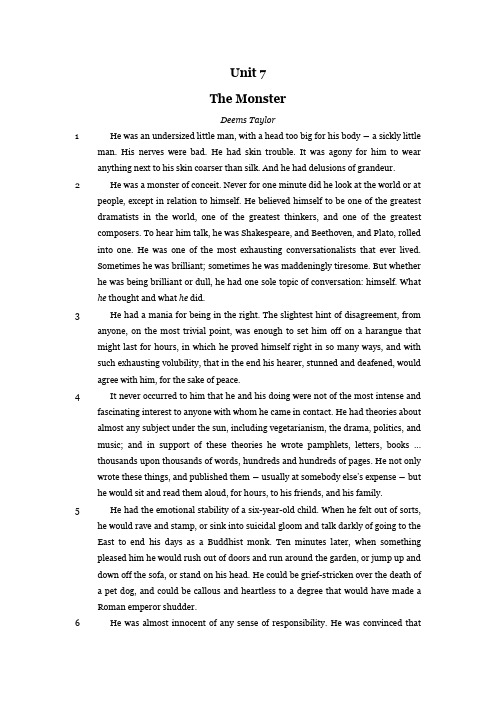
Unit 7The MonsterDeems Taylor1He was an undersized little man, with a head too big for his body ― a sickly little man. His nerves were bad. He had skin trouble. It was agony for him to wear anything next to his skin coarser than silk. And he had delusions of grandeur.2He was a monster of conceit. Never for one minute did he look at the world or at people, except in relation to himself. He believed himself to be one of the greatest dramatists in the world, one of the greatest thinkers, and one of the greatest composers. To hear him talk, he was Shakespeare, and Beethoven, and Plato, rolled into one. He was one of the most exhausting conversationalists that ever lived.Sometimes he was brilliant; sometimes he was maddeningly tiresome. But whether he was being brilliant or dull, he had one sole topic of conversation: himself. What he thought and what he did.3He had a mania for being in the right. The slightest hint of disagreement, from anyone, on the most trivial point, was enough to set him off on a harangue that might last for hours, in which he proved himself right in so many ways, and with such exhausting volubility, that in the end his hearer, stunned and deafened, would agree with him, for the sake of peace.4It never occurred to him that he and his doing were not of the most intense and fascinating interest to anyone with whom he came in contact. He had theories about almost any subject under the sun, including vegetarianism, the drama, politics, and music; and in support of these theories he wrote pamphlets, letters, books ...thousands upon thousands of words, hundreds and hundreds of pages. He not only wrote these things, and published them ― usually at somebody else’s expense ― but he would sit and read them aloud, for hours, to his friends, and his family.5He had the emotional stability of a six-year-old child. When he felt out of sorts, he would rave and stamp, or sink into suicidal gloom and talk darkly of going to the East to end his days as a Buddhist monk. Ten minutes later, when something pleased him he would rush out of doors and run around the garden, or jump up and down off the sofa, or stand on his head. He could be grief-stricken over the death ofa pet dog, and could be callous and heartless to a degree that would have made aRoman emperor shudder.6He was almost innocent of any sense of responsibility. He was convinced thatthe world owed him a living. In support of this belief, he borrowed money from everybody who was good for a loan ― men, women, friends, or strange rs. He wrote begging letters by the score, sometimes groveling without shame, at others loftily offering his intended benefactor the privilege of contributing to his support, and being mortally offended if the recipient declined the honor.7What money he could lay his hand on he spent like an Indian rajah. No one will ever know ― certainly he never knows ― how much money he owed. We do know that his greatest benefactor gave him $6,000 to pay the most pressing of his debts in one city, and a year later had to give him $16,000 to enable him to live in another city without being thrown into jail for debt.8He was equally unscrupulous in other ways. An endless procession of women marched through his life. His first wife spent twenty years enduring and forgiving his infidelities. His second wife had been the wife of his most devoted friend and admirer, from whom he stole her. And even while he was trying to persuade her to leave her first husband he was writing to a friend to inquire whether he could suggest some wealthy woman ― any wealthy woman ― whom he could marry for her money.9He had a genius for making enemies. He would insult a man who disagreed with him about the weather. He would pull endless wires in order to meet some man who admired his work and was able and anxious to be of use to him ― and would proceed to make a mortal enemy of him with some idiotic and wholly uncalled-for exhibition of arrogance and bad manners. A character in one of his operas was a caricature of one of the most powerful music critics of his day. Not content with burlesquing him, he invited the critic to his house and read him the libretto aloud in front of his friends.10The name of this monster was Richard Wagner. Everything I have said about him you can find on record ― in newspapers, in police reports, in the testimony of people who knew him, in his own letters, between the lines of his autobiography.And the curious thing about this record is that it doesn’t matter in the least.11Because this undersized, sickly, disagreeable, fascinating little man was right all the time, the joke was on us. He was one of the world’s greatest dramatists; he was a great thinker; he was one of the most stupendous musical geniuses that, up to now, the world has ever seen. The world did owe him a living. What if he did talk about himself all the time? If he talked about himself for twenty-four hours every day for the span of his life he would not have uttered half the number of words that othermen have spoken and written about him since his death.12When you consider what he wrote ― thirteen operas and music dramas, eleven of them still holding the stage, eight of them unquestionably worth ranking among the world’s great musico-dramatic masterpieces ― when you listen to what he wrote, the debts and heartaches that people had to endure from him don’t seem much of a price.13What if he was faithless to his friends and to his wives? He had one mistress to whom he was faithful to the day of his death: Music. Not for a single moment did he ever compromise with what he believed, with what he dreamed. There is not a line of his music that could have been conceived by a little mind. Even when he is dull, or downright bad, he is dull in the grand manner. Listening to his music, one does not forgive him for what he may or may not have been. It is not a matter of forgiveness. It is a matter of being dumb with wonder that his poor brain and body didn’t burst under the torment of the demon of creative energy that lived inside him, struggling, clawing, scratching to be released; tearing, shrieking at him to write the music that was in him. The miracle is that what he did in the little space of seventy years could have been done at all, even by a great genius. Is it any wonder he had no time to be a man?畸人迪姆斯·泰勒1 他是个大头小身体、病怏怏的矬子;成日神经兮兮,皮肤也有毛病。
新标准英语综合教程4unit7课文全文翻译
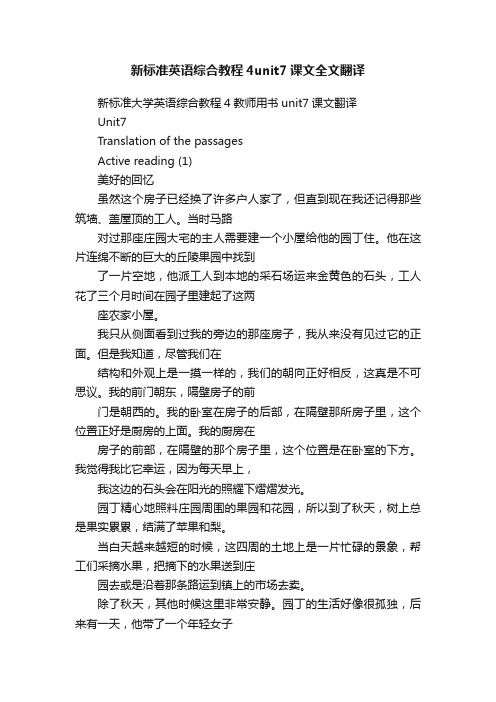
新标准英语综合教程4unit7课文全文翻译新标准大学英语综合教程4教师用书unit7课文翻译Unit7Translation of the passagesActive reading (1)美好的回忆虽然这个房子已经换了许多户人家了,但直到现在我还记得那些筑墙、盖屋顶的工人。
当时马路对过那座庄园大宅的主人需要建一个小屋给他的园丁住。
他在这片连绵不断的巨大的丘陵果园中找到了一片空地,他派工人到本地的采石场运来金黄色的石头,工人花了三个月时间在园子里建起了这两座农家小屋。
我只从侧面看到过我的旁边的那座房子,我从来没有见过它的正面。
但是我知道,尽管我们在结构和外观上是一摸一样的,我们的朝向正好相反,这真是不可思议。
我的前门朝东,隔壁房子的前门是朝西的。
我的卧室在房子的后部,在隔壁那所房子里,这个位置正好是厨房的上面。
我的厨房在房子的前部,在隔壁的那个房子里,这个位置是在卧室的下方。
我觉得我比它幸运,因为每天早上,我这边的石头会在阳光的照耀下熠熠发光。
园丁精心地照料庄园周围的果园和花园,所以到了秋天,树上总是果实累累,结满了苹果和梨。
当白天越来越短的时候,这四周的土地上是一片忙碌的景象,帮工们采摘水果,把摘下的水果送到庄园去或是沿着那条路运到镇上的市场去卖。
除了秋天,其他时候这里非常安静。
园丁的生活好像很孤独,后来有一天,他带了一个年轻女子回家。
我这个房子里顿时充满了欢声笑语和饭菜的香味。
园丁外出干活的时候,他的妻子会照看我周围的花园,种玫瑰、水仙和郁金香,还有夏季植物和菊花。
从早春的鲜花到深秋的深深的金黄色叶子,花园里真是五彩缤纷。
能照看这样一对夫妇,我感觉很幸福。
没过多久,又有孩子要照看了。
头一个孩子是女孩,她常常高兴得咯咯笑,睡得也很沉。
后来又添了一个男孩,他哭起来嗓门很大,让我们大家都不得安宁。
但是他们都很快乐,也很听话。
他们会静静地在屋里或花园里一起玩耍。
渐渐地,他们长大了,也长高了。
最让我感到愉快的一个记忆是:在一个温暖的夏日,我看到男孩高高地坐在苹果树的枝干上,读着他最喜爱的那本书。
The-Monster课文翻译
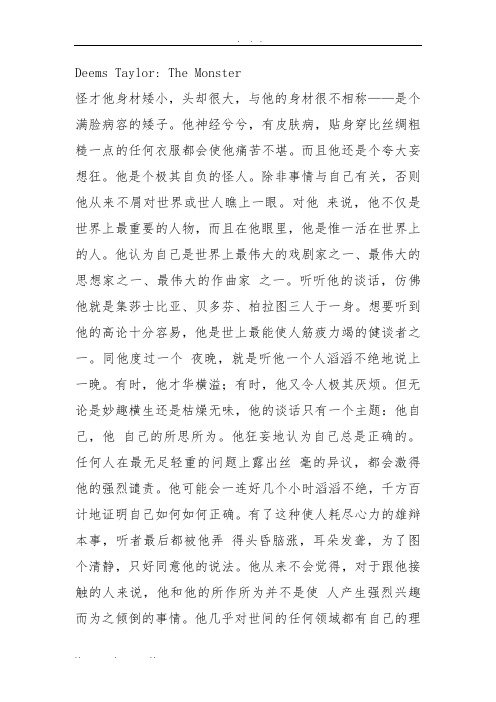
Deems Taylor: The Monster怪才他身材矮小,头却很大,与他的身材很不相称——是个满脸病容的矮子。
他神经兮兮,有皮肤病,贴身穿比丝绸粗糙一点的任何衣服都会使他痛苦不堪。
而且他还是个夸大妄想狂。
他是个极其自负的怪人。
除非事情与自己有关,否则他从来不屑对世界或世人瞧上一眼。
对他来说,他不仅是世界上最重要的人物,而且在他眼里,他是惟一活在世界上的人。
他认为自己是世界上最伟大的戏剧家之一、最伟大的思想家之一、最伟大的作曲家之一。
听听他的谈话,仿佛他就是集莎士比亚、贝多芬、柏拉图三人于一身。
想要听到他的高论十分容易,他是世上最能使人筋疲力竭的健谈者之一。
同他度过一个夜晚,就是听他一个人滔滔不绝地说上一晚。
有时,他才华横溢;有时,他又令人极其厌烦。
但无论是妙趣横生还是枯燥无味,他的谈话只有一个主题:他自己,他自己的所思所为。
他狂妄地认为自己总是正确的。
任何人在最无足轻重的问题上露出丝毫的异议,都会激得他的强烈谴责。
他可能会一连好几个小时滔滔不绝,千方百计地证明自己如何如何正确。
有了这种使人耗尽心力的雄辩本事,听者最后都被他弄得头昏脑涨,耳朵发聋,为了图个清静,只好同意他的说法。
他从来不会觉得,对于跟他接触的人来说,他和他的所作所为并不是使人产生强烈兴趣而为之倾倒的事情。
他几乎对世间的任何领域都有自己的理论,包括素食主义、戏剧、政治以及音乐。
为了证实这些理论,他写小册子、写信、写书……文字成千上万,连篇累牍。
他不仅写了,还出版了这些东西——所需费用通常由别人支付——而他会坐下来大声读给朋友和家人听,一读就是好几个小时。
他写歌剧,但往往是刚有个故事梗概,他就邀请——或者更确切说是召集——一群朋友到家里,高声念给大家听。
不是为了获得批评,而是为了获得称赞。
整部剧的歌词写好后,朋友们还得再去听他高声朗读全剧。
然后他就拿去发表,有时几年后才为歌词谱曲。
他也像作曲家一样弹钢琴,但要多糟有多糟。
然而,他却要坐在钢琴前,面对包括他那个时代最杰出的钢琴家在的聚会人群,一小时接一小时地给他们演奏,不用说,都是他自己的作品。
(完整版)Unit7TheMonster课文翻译综合教程四

Unit 7The MonsterDeems Taylor1He was an undersized little man, with a head too big for his body ― a sickly little man. His nerves were bad. He had skin trouble. It was agony for him to wear anything next to his skin coarser than silk. And he had delusions of grandeur.2He was a monster of conceit. Never for one minute did he look at the world or at people, except in relation to himself. He believed himself to be one of the greatest dramatists in the world, one of the greatest thinkers, and one of the greatest composers. To hear him talk, he was Shakespeare, and Beethoven, and Plato, rolled into one. He was one of the most exhausting conversationalists that ever lived.Sometimes he was brilliant; sometimes he was maddeningly tiresome. But whether he was being brilliant or dull, he had one sole topic of conversation: himself. What he thought and what he did.3He had a mania for being in the right. The slightest hint of disagreement, from anyone, on the most trivial point, was enough to set him off on a harangue that might last for hours, in which he proved himself right in so many ways, and with such exhausting volubility, that in the end his hearer, stunned and deafened, would agree with him, for the sake of peace.4It never occurred to him that he and his doing were not of the most intense and fascinating interest to anyone with whom he came in contact. He had theories about almost any subject under the sun, including vegetarianism, the drama, politics, and music; and in support of these theories he wrote pamphlets, letters, books ...thousands upon thousands of words, hundreds and hundreds of pages. He not only wrote these things, and published them ― usually at somebody else’s expense ― but he would sit and read them aloud, for hours, to his friends, and his family.5He had the emotional stability of a six-year-old child. When he felt out of sorts, he would rave and stamp, or sink into suicidal gloom and talk darkly of going to the East to end his days as a Buddhist monk. Ten minutes later, when something pleased him he would rush out of doors and run around the garden, or jump up and down off the sofa, or stand on his head. He could be grief-stricken over the death ofa pet dog, and could be callous and heartless to a degree that would have made aRoman emperor shudder.6He was almost innocent of any sense of responsibility. He was convinced thatthe world owed him a living. In support of this belief, he borrowed money from everybody who was good for a loan ― men, women, friends, or strange rs. He wrote begging letters by the score, sometimes groveling without shame, at others loftily offering his intended benefactor the privilege of contributing to his support, and being mortally offended if the recipient declined the honor.7What money he could lay his hand on he spent like an Indian rajah. No one will ever know ― certainly he never knows ― how much money he owed. We do know that his greatest benefactor gave him $6,000 to pay the most pressing of his debts in one city, and a year later had to give him $16,000 to enable him to live in another city without being thrown into jail for debt.8He was equally unscrupulous in other ways. An endless procession of women marched through his life. His first wife spent twenty years enduring and forgiving his infidelities. His second wife had been the wife of his most devoted friend and admirer, from whom he stole her. And even while he was trying to persuade her to leave her first husband he was writing to a friend to inquire whether he could suggest some wealthy woman ― any wealthy woman ― whom he could marry for her money.9He had a genius for making enemies. He would insult a man who disagreed with him about the weather. He would pull endless wires in order to meet some man who admired his work and was able and anxious to be of use to him ― and would proceed to make a mortal enemy of him with some idiotic and wholly uncalled-for exhibition of arrogance and bad manners. A character in one of his operas was a caricature of one of the most powerful music critics of his day. Not content with burlesquing him, he invited the critic to his house and read him the libretto aloud in front of his friends.10The name of this monster was Richard Wagner. Everything I have said about him you can find on record ― in newspapers, in police reports, in the testimony of people who knew him, in his own letters, between the lines of his autobiography.And the curious thing about this record is that it doesn’t matter in the least.11Because this undersized, sickly, disagreeable, fascinating little man was right all the time, the joke was on us. He was one of the world’s greatest dramatists; he was a great thinker; he was one of the most stupendous musical geniuses that, up to now, the world has ever seen. The world did owe him a living. What if he did talk about himself all the time? If he talked about himself for twenty-four hours every day for the span of his life he would not have uttered half the number of words that othermen have spoken and written about him since his death.12When you consider what he wrote ― thirteen operas and music dramas, eleven of them still holding the stage, eight of them unquestionably worth ranking among the world’s great musico-dramatic masterpieces ― when you listen to what he wrote, the debts and heartaches that people had to endure from him don’t seem much of a price.13What if he was faithless to his friends and to his wives? He had one mistress to whom he was faithful to the day of his death: Music. Not for a single moment did he ever compromise with what he believed, with what he dreamed. There is not a line of his music that could have been conceived by a little mind. Even when he is dull, or downright bad, he is dull in the grand manner. Listening to his music, one does not forgive him for what he may or may not have been. It is not a matter of forgiveness. It is a matter of being dumb with wonder that his poor brain and body didn’t burst under the torment of the demon of creative energy that lived inside him, struggling, clawing, scratching to be released; tearing, shrieking at him to write the music that was in him. The miracle is that what he did in the little space of seventy years could have been done at all, even by a great genius. Is it any wonder he had no time to be a man?畸人迪姆斯·泰勒1 他是个大头小身体、病怏怏的矬子;成日神经兮兮,皮肤也有毛病。
The_Monster课文翻译
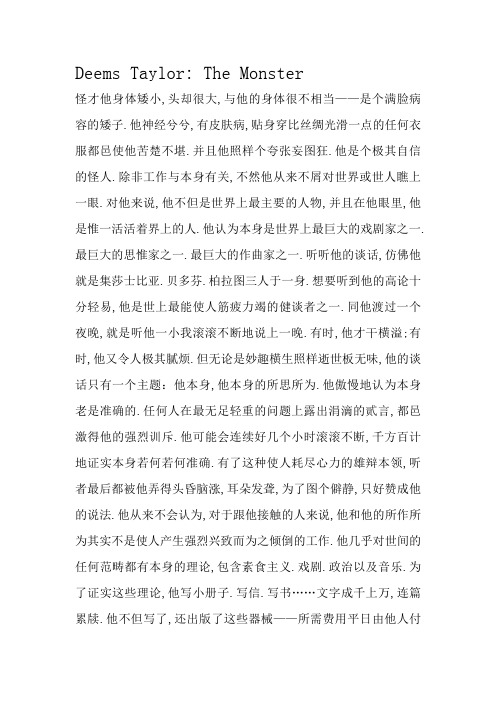
Deems Taylor: The Monster怪才他身体矮小,头却很大,与他的身体很不相当——是个满脸病容的矮子.他神经兮兮,有皮肤病,贴身穿比丝绸光滑一点的任何衣服都邑使他苦楚不堪.并且他照样个夸张妄图狂.他是个极其自信的怪人.除非工作与本身有关,不然他从来不屑对世界或世人瞧上一眼.对他来说,他不但是世界上最主要的人物,并且在他眼里,他是惟一活活着界上的人.他认为本身是世界上最巨大的戏剧家之一.最巨大的思惟家之一.最巨大的作曲家之一.听听他的谈话,仿佛他就是集莎士比亚.贝多芬.柏拉图三人于一身.想要听到他的高论十分轻易,他是世上最能使人筋疲力竭的健谈者之一.同他渡过一个夜晚,就是听他一小我滚滚不断地说上一晚.有时,他才干横溢;有时,他又令人极其腻烦.但无论是妙趣横生照样逝世板无味,他的谈话只有一个主题:他本身,他本身的所思所为.他傲慢地认为本身老是准确的.任何人在最无足轻重的问题上露出涓滴的贰言,都邑激得他的强烈训斥.他可能会连续好几个小时滚滚不断,千方百计地证实本身若何若何准确.有了这种使人耗尽心力的雄辩本领,听者最后都被他弄得头昏脑涨,耳朵发聋,为了图个僻静,只好赞成他的说法.他从来不会认为,对于跟他接触的人来说,他和他的所作所为其实不是使人产生强烈兴致而为之倾倒的工作.他几乎对世间的任何范畴都有本身的理论,包含素食主义.戏剧.政治以及音乐.为了证实这些理论,他写小册子.写信.写书……文字成千上万,连篇累牍.他不但写了,还出版了这些器械——所需费用平日由他人付出——而他会坐下来大声读给同伙和家人听,一读就是好几个小时.他写歌剧,但往往是刚有个故事梗概,他就邀请——或者更确切说是召集——一群同伙到家里,大声念给大家听.不是为了获得批驳,而是为了获得赞扬.整部剧的歌词写好后,同伙们还得再去听他大声朗读全剧.然后他就拿去揭橥,有时几年后才为歌词谱曲.他也像作曲家一样弹钢琴,但要多糟有多糟.然而,他却要坐在钢琴前,面临包含他谁人时期最出色的钢琴家在内的聚首人群,一小时接一小时地给他们吹奏,不必说,都是他本身的作品.他有一副作曲家的嗓子,但他会把有名的歌颂家请到本身家里,为他们演唱本身的作品,还要扮演剧中所有的脚色.他的情感如同六岁儿童,极易摇动.心境不好时,他要么用力顿脚,口出大言,要么陷入极端的愁闷,阴森地说要去东方当僧人,了此残生.十分钟后,假若有什么工作使他愉快了,他就会冲出门去,绕开花圃跑个不断,或者在沙发上跳上跳下或拿大顶.他会因爱犬逝世了而极端哀思,也会残暴无情到使罗马皇帝也毛骨悚然.他几乎没有涓滴义务感.他似乎不但没有赡养本身的才能,也从没想到过有这个义务.他深信这个世界应当给他一条活路.为了支撑这一信心,他向一切借得着钱的人借债——不管是男是女,也不管是同伙照样陌路人.乞助信他一写就是二十封——有时卑恭屈节,掉落臂羞辱,有时又趾高气扬地授予他预期的赞助人赞助他的殊荣,如果对方拒绝这一声誉,他会气得要逝世.我还没见到假如借主不告上法庭他会自动付帐或还钱的记载.只要他能弄到钱,他花起来老是像个印度王公.只要他的某部歌剧一有上演的可能,他便会立时肆意花钱,敏捷积欠一笔十倍于预期所得版税的债务.没有人搞得清晰——他本身确定也不清晰——他欠了若干钱.但我们确切知道,他的一位最大方的赞助人曾给他六千美元清偿他在某市最急切的债务;一年之后,不克不及不再给他一万六千美元,使他得以在另一城市安身,而不致因负债去坐牢.他在其他方面也是放纵不羁.很多个女人曾进入过他的生涯.他的正室与他一路生涯了二十年,是在不断地忍耐和谅解他的不忠中渡过的.他的第二个老婆本是最崇拜他.对他最忠诚的同伙的老婆,他从石友手中夺走了她.他甚至在劝告她分开第一个丈夫之际,还同时写信给一个同伙,讯问可否给他介绍个阔妇人——有钱就行——他可认为了金钱跟她娶亲.他在其他私家交往中也极端自私.他对同伙有无好感,完整取决于他们对他是否绝对忠诚,抑或他们在经济上或艺术上对他是否有效.一旦他们使他掉望——即使是拒绝赴宴之类的小事——或者他们对他不再那么有效,他就会毫不迟疑地与他们拒却交往.在他性命的最后日子里,他只剩下了一个同伙,就连这个同伙也照样他在中年时才熟悉的.这位怪才的名字叫理查德·瓦格纳.我所谈到的关于他的一切情形都有记载可查——包含报纸.警方陈述.熟悉他的人的证词.他本身的信件以及他的自传.但令人奇异的是,这种记载对他的名望涓滴无损.因为,这个身体矮小.满脸病容.性格怪僻.令人入神的小个子自始至终都是对的.该受嘲笑的是我们.他是全世界最巨大的剧作家之一,一位巨大的思惟家,是迄今为止全世界最了不得的音乐天才之一.这个世界确切应当赡养他.当你掂量他的作品时——十三部歌剧和音乐剧,个中十一部仍然长演不衰,八部当之无愧地位于世界音乐剧巨大名作之列——当你凝听他的作品时,他负债不还也好,伤透人心也罢,这些代价似乎都不算什么.想一想命运至少曾一度赐给拿破仑,谁人葬送法国.洗劫欧洲的人何种的豪华吧.比拟之下,你也许会赞成,用几千元的债务来换得《指环》三部曲其实不太贵.即使他不忠于同伙和老婆,又有什么关系呢?他有一位他至逝世都忠贞不渝的情侣:音乐.他一刻也没有摇动过本身的信心和憧憬.他的作品中没有一行曲谱是平淡之辈构思得出的.即使他有逝世板乏味或极其糟糕的作品,其乏味中仍可见巨大之处.他最糟的败笔中也有不凡之处.人们凝听他的乐曲时,其实不因他也许曾是或不是什么样的人而饶恕他.这不是饶恕不饶恕的问题.这是件令人惊奇得木鸡之呆的工作——他体内无穷的创造力,像魔鬼般舍命挣扎.又挖又挠试图冲出体外;这恶魔撕扯着他,冲他狂叫,要他谱写出藏于体内的乐曲.遭遇如斯苦楚的熬煎,他那可怜的脑壳和身躯竟没有被压垮,这岂不是人世事业?而真正的事业在于,短短七十年,他居然完成了那么多的工作,即使是一个巨大的天才,也难以做到.是以他没有时光过常人的生涯,这又有什么好奇异的呢?。
最新Unit-7-The-Monster课文翻译综合教程四
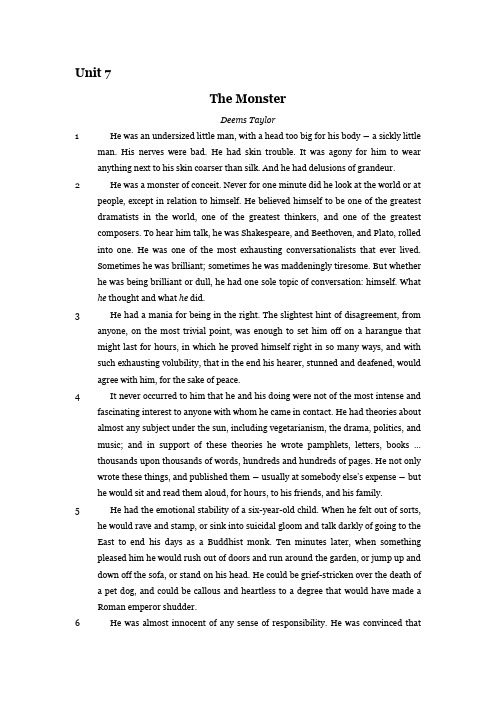
Unit 7The MonsterDeems Taylor1He was an undersized little man, with a head too big for his body ― a sickly little man. His nerves were bad. He had skin trouble. It was agony for him to wear anything next to his skin coarser than silk. And he had delusions of grandeur.2He was a monster of conceit. Never for one minute did he look at the world or at people, except in relation to himself. He believed himself to be one of the greatest dramatists in the world, one of the greatest thinkers, and one of the greatest composers. To hear him talk, he was Shakespeare, and Beethoven, and Plato, rolled into one. He was one of the most exhausting conversationalists that ever lived.Sometimes he was brilliant; sometimes he was maddeningly tiresome. But whether he was being brilliant or dull, he had one sole topic of conversation: himself. What he thought and what he did.3He had a mania for being in the right. The slightest hint of disagreement, from anyone, on the most trivial point, was enough to set him off on a harangue that might last for hours, in which he proved himself right in so many ways, and with such exhausting volubility, that in the end his hearer, stunned and deafened, would agree with him, for the sake of peace.4It never occurred to him that he and his doing were not of the most intense and fascinating interest to anyone with whom he came in contact. He had theories about almost any subject under the sun, including vegetarianism, the drama, politics, and music; and in support of these theories he wrote pamphlets, letters, books ...thousands upon thousands of words, hundreds and hundreds of pages. He not only wrote these things, and published them ― usually at somebody else’s expense ― but he would sit and read them aloud, for hours, to his friends, and his family.5He had the emotional stability of a six-year-old child. When he felt out of sorts, he would rave and stamp, or sink into suicidal gloom and talk darkly of going to the East to end his days as a Buddhist monk. Ten minutes later, when something pleased him he would rush out of doors and run around the garden, or jump up and down off the sofa, or stand on his head. He could be grief-stricken over the death ofa pet dog, and could be callous and heartless to a degree that would have made aRoman emperor shudder.6He was almost innocent of any sense of responsibility. He was convinced thatthe world owed him a living. In support of this belief, he borrowed money from everybody who was good for a loan ― men, women, friends, or strangers. He wrote begging letters by the score, sometimes groveling without shame, at others loftily offering his intended benefactor the privilege of contributing to his support, and being mortally offended if the recipient declined the honor.7What money he could lay his hand on he spent like an Indian rajah. No one will ever know ― certainly he never knows ― how much money he owed. We do know that his greatest benefactor gave him $6,000 to pay the most pressing of his debts in one city, and a year later had to give him $16,000 to enable him to live in another city without being thrown into jail for debt.8He was equally unscrupulous in other ways. An endless procession of women marched through his life. His first wife spent twenty years enduring and forgiving his infidelities. His second wife had been the wife of his most devoted friend and admirer, from whom he stole her. And even while he was trying to persuade her to leave her first husband he was writing to a friend to inquire whether he could suggest some wealthy woman ― any wealthy woman ― whom he could marry for her money.9He had a genius for making enemies. He would insult a man who disagreed with him about the weather. He would pull endless wires in order to meet some man who admir ed his work and was able and anxious to be of use to him ― and would proceed to make a mortal enemy of him with some idiotic and wholly uncalled-for exhibition of arrogance and bad manners. A character in one of his operas was a caricature of one of the most powerful music critics of his day. Not content with burlesquing him, he invited the critic to his house and read him the libretto aloud in front of his friends.10The name of this monster was Richard Wagner. Everything I have said about him you can fi nd on record ― in newspapers, in police reports, in the testimony of people who knew him, in his own letters, between the lines of his autobiography.And the curious thing about this record is that it doesn’t matter in the least.11Because this undersized, sickly, disagreeable, fascinating little man was right all the time, the joke was on us. He was one of the world’s greatest dramatists; he was a great thinker; he was one of the most stupendous musical geniuses that, up to now, the world has ever seen. The world did owe him a living. What if he did talk about himself all the time? If he talked about himself for twenty-four hours every day for the span of his life he would not have uttered half the number of words that othermen have spoken and written about him since his death.12When you consider what he wrote ― thirteen operas and music dramas, eleven of them still holding the stage, eight of them unquestionably worth ranking among the world’s great musico-dramatic masterpieces ― when you listen to wh at he wrote, the debts and heartaches that people had to endure from him don’t seem much of a price.13What if he was faithless to his friends and to his wives? He had one mistress to whom he was faithful to the day of his death: Music. Not for a single moment did he ever compromise with what he believed, with what he dreamed. There is not a line of his music that could have been conceived by a little mind. Even when he is dull, or downright bad, he is dull in the grand manner. Listening to his music, one does not forgive him for what he may or may not have been. It is not a matter of forgiveness. It is a matter of being dumb with wonder that his poor brain and body didn’t burst under the torment of the demon of creative energy that lived inside him, struggling, clawing, scratching to be released; tearing, shrieking at him to write the music that was in him. The miracle is that what he did in the little space of seventy years could have been done at all, even by a great genius. Is it any wonder he had no time to be a man?畸人迪姆斯·泰勒1 他是个大头小身体、病怏怏的矬子;成日神经兮兮,皮肤也有毛病。
- 1、下载文档前请自行甄别文档内容的完整性,平台不提供额外的编辑、内容补充、找答案等附加服务。
- 2、"仅部分预览"的文档,不可在线预览部分如存在完整性等问题,可反馈申请退款(可完整预览的文档不适用该条件!)。
- 3、如文档侵犯您的权益,请联系客服反馈,我们会尽快为您处理(人工客服工作时间:9:00-18:30)。
Unit 7The MonsterDeems Taylor1He was an undersized little man, with a head too big for his body ― a sickly little man. His nerves were bad. He had skin trouble. It was agony for him to wear anything next to his skin coarser than silk. And he had delusions of grandeur.2He was a monster of conceit. Never for one minute did he look at the world or at people, except in relation to himself. He believed himself to be one of the greatest dramatists in the world, one of the greatest thinkers, and one of the greatest composers. To hear him talk, he was Shakespeare, and Beethoven, and Plato, rolled into one. He was one of the most exhausting conversationalists that ever lived.Sometimes he was brilliant; sometimes he was maddeningly tiresome. But whether he was being brilliant or dull, he had one sole topic of conversation: himself. What he thought and what he did.3He had a mania for being in the right. The slightest hint of disagreement, from anyone, on the most trivial point, was enough to set him off on a harangue that might last for hours, in which he proved himself right in so many ways, and with such exhausting volubility, that in the end his hearer, stunned and deafened, would agree with him, for the sake of peace.4It never occurred to him that he and his doing were not of the most intense and fascinating interest to anyone with whom he came in contact. He had theories about almost any subject under the sun, including vegetarianism, the drama, politics, and music; and in support of these theories he wrote pamphlets, letters, books ...thousands upon thousands of words, hundreds and hundreds of pages. He not only wrote these things, and published them ― usually at somebody else’s expense ― but he would sit and read them aloud, for hours, to his friends, and his family.5He had the emotional stability of a six-year-old child. When he felt out of sorts, he would rave and stamp, or sink into suicidal gloom and talk darkly of going to the East to end his days as a Buddhist monk. Ten minutes later, when something pleased him he would rush out of doors and run around the garden, or jump up and down off the sofa, or stand on his head. He could be grief-stricken over the death ofa pet dog, and could be callous and heartless to a degree that would have made aRoman emperor shudder.6He was almost innocent of any sense of responsibility. He was convinced thatthe world owed him a living. In support of this belief, he borrowed money from everybody who was good for a loan ― men, women, friends, or strange rs. He wrote begging letters by the score, sometimes groveling without shame, at others loftily offering his intended benefactor the privilege of contributing to his support, and being mortally offended if the recipient declined the honor.7What money he could lay his hand on he spent like an Indian rajah. No one will ever know ― certainly he never knows ― how much money he owed. We do know that his greatest benefactor gave him $6,000 to pay the most pressing of his debts in one city, and a year later had to give him $16,000 to enable him to live in another city without being thrown into jail for debt.8He was equally unscrupulous in other ways. An endless procession of women marched through his life. His first wife spent twenty years enduring and forgiving his infidelities. His second wife had been the wife of his most devoted friend and admirer, from whom he stole her. And even while he was trying to persuade her to leave her first husband he was writing to a friend to inquire whether he could suggest some wealthy woman ― any wealthy woman ― whom he could marry for her money.9He had a genius for making enemies. He would insult a man who disagreed with him about the weather. He would pull endless wires in order to meet some man who admired his work and was able and anxious to be of use to him ― and would proceed to make a mortal enemy of him with some idiotic and wholly uncalled-for exhibition of arrogance and bad manners. A character in one of his operas was a caricature of one of the most powerful music critics of his day. Not content with burlesquing him, he invited the critic to his house and read him the libretto aloud in front of his friends.10The name of this monster was Richard Wagner. Everything I have said about him you can find on record ― in newspapers, in police reports, in the testimony of people who knew him, in his own letters, between the lines of his autobiography.And the curious thing about this record is that it doesn’t matter in the least.11Because this undersized, sickly, disagreeable, fascinating little man was right all the time, the joke was on us. He was one of the world’s greatest dramatists; he was a great thinker; he was one of the most stupendous musical geniuses that, up to now, the world has ever seen. The world did owe him a living. What if he did talk about himself all the time? If he talked about himself for twenty-four hours every day for the span of his life he would not have uttered half the number of words that othermen have spoken and written about him since his death.12When you consider what he wrote ― thirteen operas and music dramas, eleven of them still holding the stage, eight of them unquestionably worth ranking among the world’s great musico-dramatic masterpieces ― when you listen to what he wrote, the debts and heartaches that people had to endure from him don’t seem much of a price.13What if he was faithless to his friends and to his wives? He had one mistress to whom he was faithful to the day of his death: Music. Not for a single moment did he ever compromise with what he believed, with what he dreamed. There is not a line of his music that could have been conceived by a little mind. Even when he is dull, or downright bad, he is dull in the grand manner. Listening to his music, one does not forgive him for what he may or may not have been. It is not a matter of forgiveness. It is a matter of being dumb with wonder that his poor brain and body didn’t burst under the torment of the demon of creative energy that lived inside him, struggling, clawing, scratching to be released; tearing, shrieking at him to write the music that was in him. The miracle is that what he did in the little space of seventy years could have been done at all, even by a great genius. Is it any wonder he had no time to be a man?畸人迪姆斯·泰勒1 他是个大头小身体、病怏怏的矬子;成日神经兮兮,皮肤也有毛病。
